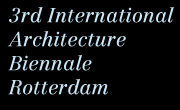PowerNotes #2
Berlage Institute - Sunday 20 May 2007
In the early evening of a muggy Dutch Sunday more than sixty eager participants in the biennale masterclass received a warm welcome in the Berlage Institute. "You are selected from the world's most renowned universities. Rotterdam feels lucky: the future of the world's architecture is gathered here tonight!" stated master Pier Vittorio Aureli (Berlage Insitute). Together with the other masters, Elia Zenghelis (architect and cofounder of the Office of Metropolitan Architecture) and Joan Ockman (Columbia University), he will inspire and encourage everybody to make this masterclass a great succes.
The task is ambitious and the organizers have high expectations. With a length of ten days this masterclass will be more intense and longer than usual. "We don't see you as students but as professional architects", warned Aureli. "But you should consider time. Don't visit all the lectures and events". Most participants arrived just this weekend, but no one seems to have any jet-lag problems. Some of the students visit Europe for the first time and used the opportunity to do some traveling before the masterclass started. Others will see more after the job is done.
George Brugmans, director of the Biennial warned that the theory must be connected with the concrete. The results of this masterclass should be real projects that effectively can be build. Curator Joachim Declerck pointed out that this Bienniale is a test case to research and redefine the future meaning of the city. For the masterclass this means a research into what is happening south of the river. For many politicians and investors this part of Rotterdam is a white spot on the map and they see the city divided into two parts. This masterclass aims at underpinning reinvestments in the South, the 'bad part of town'. It should be a catalyst when it comes to rethinking and remodeling this relatively unknown but very fascinating part of the city of Rotterdam.
The Pact op Zuid (the group of housing corporations, developers and borough working on the renaissance of Rotterdam South) designated seven locations spread all over the area. Eventually the winning design could be developed into a real project. The fourteen teams constist of four or five students and one tutor, all from the same university. The teams came prepared with the prototpye for a community centre that could be adjusted to any location. Monday 21 May each group will present its models and choose its locations. Some teams already voiced a strong preference for a specific location. Especially Pendrecht seems to be a challenging site. A participant from Japan mentioned that it will be difficult to work with the mix of different cultures here in Rotterdam. In Japan most cities have no strong cultural segregation. This theme is also new for most Chinese and maybe also for Indian participants. But the search for new identities is international and familiar to all participants. This masterclass will be a cultural exchange and learning process for everyone.
The masterclass 'Form and the City: The Hidden Strength of Rotterdam South' is organized by the Architecture Biennale and the Berlage Institute in association with Columbia University. The task of the participants is to design a series of multifunctional community buildings (MFA) that are to become Rotterdam South's new icons: distinct, attractive landmarks to express Rotterdam South's new-found strength'. The students were asked to design centres for seven locations
Participating schools: Columbia University, New York, USA Diego Portales University, Santiago, Chile ETH Zurich, Switzerland Kansai University Tokyo, Japan MIT, Cambridge, USA Tsinghua University, Beijing, China UPC Barcelona, Spain TU Delft, the Netherlands Berlage Institute, Rotterdam, the Netherlands (5 teams)
From 3 June to 1 July, all designs will be exhibited on the top floor of the municipal district office of the municipality Feijenoord. Admission is free. The municipality office Feijenoord is located opposite the Maashaven metro station in Rotterdam Zuid. The exhibition entrance is at the back of the building. Address Maashaven Oostzijde (eastside) 230, 3072 HS Rotterdam.
|
POWER -
Producing the Contemporary City
24 May - 2 September 2007
Producing the Contemporary City
24 May - 2 September 2007
Nederlands | English
"Capital City is projected as a designated center within an urban formation whereby political decisions takes precedent over market-controlled economic forces." (Pier Vittorio Aureli)


